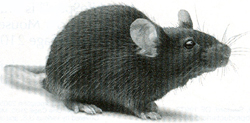 |
|
| Millions
of mice, rabbits, guinea pigs, cats, dogs, primates and other
animals are killed each year in the U.S. in scientific research,
product and cosmetic testing, and in education. The animal's only
legal protection, the federal Animal Welfare Act does not cover
rats, mice or fish, despite the fact that they make up approx.
95% of all animals used in research! The Act does not prohibit
any experiment, no matter how frivolous or painful.
The justification for using animals in experiments is usually a promise of scientific discovery. Research institutions promise cures to diseases such as AIDS, cancer and diabetes. The reality is that creating disease in healthy animals is an unreliable way to study human diseases. Because of biological differences between species, animal research yields results that cannot be safely applied to humans. Animal rights advocates are not anti-science. We believe animals have the right to not be exploited as experimental subjects, but we are also convinced that animal research harms humans by diverting research dollars that should be going to proven methods of curing disease. An increasing number of doctors and scientists are voicing their opposition to animal research based on scientific reasons. Innovative non-animal research methods such as human clinical and in vitro (test tube) research, cell and tissue cultures, epidemiology, and genetic research are more effective methods of studying disease and to test the effectiveness and toxicity of drugs. If you are concerned about the welfare of animals in laboratories, please become involved in our campaigns against animal research. |
|
Animal
Research in Florida The largest research facilities in Florida are the University of Florida, University of Miami and the University of South Florida—each killing thousands of animals every year in experiments. Other institutions, such as Mount Sinai Medical Center, use fewer animals but have records of cruel treatment of animals. Research
facilities in Florida: (USDA
list) Important
notes: *University of Florida: In December 2009, a worker carelessly placed a cage containing five baby rats into a high-temperature cage washer. The rats were boiled to death.
In July 2009, a rabbit broke his back during a routine nail trimming procedure. A technician was blamed for not supporting the animal's back properly. The rabbit was euthanized. |
|
 Troubled
by dissection? Troubled
by dissection?Students in Florida public schools (grades K-12) have the right to refuse to dissect on animals (Florida statute 1003.47). Today, there are many humane alternatives to classroom dissection— including models, computer software and other state-of-the-art educational materials. Visit www.Animalearn.org for more information about alternative methods. Please
contact ARFF if your school has refused
to provide you with an alternative to dissection, or if you feel
that you are being penalized for choosing a non-animal alternative. |
|
|
Be
a caring consumer; please only buy products from companies that
have adopted a non-animal-testing policy. Visit the below links
to view lists of companies that do/that don't test on animals: |
|
|
Links |
|
1431 N. Federal Highway • Fort Lauderdale, Florida 33304 • (954) 727-ARFF


 In 2010, over 15,000 animals were used in research (or held for future use) in Florida. Included in this number are 240 animals—rabbits, hamsters, guinea pigs and dogs—who were used in painful experiments during which pain-relieving drugs were not provided to the suffering animals.
In 2010, over 15,000 animals were used in research (or held for future use) in Florida. Included in this number are 240 animals—rabbits, hamsters, guinea pigs and dogs—who were used in painful experiments during which pain-relieving drugs were not provided to the suffering animals. The
Food & Drug Administration does not require animal testing
for personal care products (soap, cosmetics) or household products
(laundry detergent, floor cleaner). Non-animal test methods exist
today that accurately predict product safety. Over 600 companies
manufacture cosmetics, personal care items and household products
that are not tested on animals, including Avon, Clinique, Mary
Kay, Nivea, Norelco and Revlon. Sadly,
there are still manufacturers of these products that blind and
poison animals in cruel “safety” tests.
The
Food & Drug Administration does not require animal testing
for personal care products (soap, cosmetics) or household products
(laundry detergent, floor cleaner). Non-animal test methods exist
today that accurately predict product safety. Over 600 companies
manufacture cosmetics, personal care items and household products
that are not tested on animals, including Avon, Clinique, Mary
Kay, Nivea, Norelco and Revlon. Sadly,
there are still manufacturers of these products that blind and
poison animals in cruel “safety” tests.